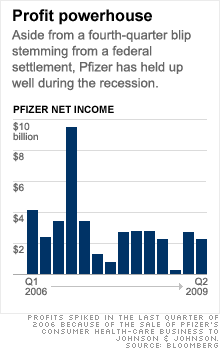Pfizer's home remedy
Mega-mergers made Pfizer the biggest pharma around. Now CEO Jeff Kindler has a plan to keep profits growing: Think small.
 |
| Jeff Kindler, CEO of Pfizer |

(Fortune Magazine) -- Shortly after he took over the company in 2006, Pfizer CEO Jeff Kindler had a revelation: Pfizer is complicated.
He didn't mean complicated in the way you might view the prospect of running a multinational with more than 80,000 employees around the globe engaged in the needle-in-a-haystack business of drug discovery. No, he actually meant something far more literal -- the company itself was just too darn complicated.
On the 23rd floor of Pfizer's headquarters in Midtown Manhattan, the stout, groomed Kindler, 54, sits at a polished table in his corner office and shows me what he means. Like a general reviewing battle plans, he points to a colorful map. While the company used to operate in 10 countries, Kindler has consolidated the research facilities to just six. Next he flips to a chart showing how Pfizer (PFE, Fortune 500) has slashed its research projects by more than 50%, from 475 to 224. He's also acquired smaller firms and restructured Pfizer's internal research to help fill the pipeline.
"We needed to be able to be more agile than we'd been," says Kindler, a lawyer by training who had been Pfizer's general counsel since 2002. "This was an incredibly complex, massive organization that just needed to be simplified."
By removing blockages to productivity, Kindler thinks he can get more drugs to market -- faster. That's vital, because in 2011 Lipitor, Pfizer's blockbuster cholesterol drug, which accounts for a quarter of its $48 billion in sales, goes off patent.
It's Lipitor and a handful of other huge-selling drugs like Viagra that have helped Pfizer turn in a consistent string of profits through the recession, earning more than $2 billion for six of the past seven quarters. (The only exception stemmed from a one-time federal settlement.) That record made Pfizer the 11th-most-profitable company on the Fortune 500 last year.
Kindler knew he couldn't continue to rely on his stable of aging blockbusters to keep the streak going, but it would take time to roll out his ambitious plans to rework Pfizer's drug-discovery process (more on that later). So in January, Pfizer announced that it would acquire rival Wyeth for $68 billion, gaining instant access to Wyeth's bestselling product lines, six of which brought in $1 billion or more last year; eight potential drugs in late-stage clinical trials; and four compounds that are awaiting approval from the FDA. Most important, the deal ensures that Pfizer won't get caught in another Lipitor death grip: Kindler has vowed that henceforth, no one medicine will make up more than 10% of the revenue mix.
But after the merger was announced, Pfizer cut its dividend in half to pay down the debt associated with the deal faster, a move that angered some investors. Though the stock price is around what it was when the deal was announced, it's trading at just eight times forward earnings, making it the cheapest of the Big Pharma stocks, based on forward estimates tracked by Thomson Reuters.
"Mega-mergers don't have a history of being successful," says Les Funtleyder, a health-care analyst at Miller Tabak in New York City. With its past acquisitions of Warner-Lambert and Pharmacia, he says, Pfizer never took the time to integrate the new company. Instead it gobbled up the potential products, leaving the scientists of the acquired company hanging. "You're trying to keep R&D people productive," he says, "but they get less productive because they're worried about keeping their jobs."
That's something Kindler is determined to avoid this time around. The company will eliminate about 15% of the combined workforce (part of its plan to cut $2 billion in costs by 2011), but Kindler has already moved swiftly to reorganize those who will remain.
When he took over, for instance, he was shocked to find 14 management layers between him and the bench scientists working at 21 sites across the world. He has since eliminated committees and levels of review, so now only eight layers lie between them and him. Geography was an issue too. Biologists and chemists collaborating on a drug were often at different research sites, putting a crimp on communications. Now there are only four major R&D sites, and most researchers in each lab are focused on the same disease. Even outsiders had become aware of the company's outsized bureaucracy. When Art Krieg, now chief scientific officer at Pfizer's Research Technology Center, considered joining the company in 2008, "I thought I'd have to go through 20 committees just to get a paper clip," he says.
Such inefficiencies irk Kindler, who helped turn around Boston Market (a unit of McDonald's) as CEO by closing 100 underperforming stores while expanding the menu and redoing seating at popular locations. The lesson: Whether you're selling chicken or cancer drugs, kill the laggards early, and you'll be able to invest in your winners.
That meant speeding up Pfizer's internal processes to approve or kill research projects. While research units were previously allowed to swell to between 300 and 400 people, Kindler and his team insisted they be capped at 150, freeing up the flow of creativity. He mandated that a chief scientific officer head each unit so that someone would always be accountable and decisions could be made in hours rather than taking weeks to go through multiple review panels. Earlier this year, for example, scientists working on a cancer compound presented data that looked good but not great. After a two-hour meeting, the researchers pulled the project, evoking the new Pfizer mantra of "Kill early and often."
To oversee this massive R&D reformation and to prepare for the integration of Wyeth employees once the deal closes, Kindler is splitting research into two groups, appointing Martin Mackay, a soccer-playing scientist who's been with Pfizer more than a decade, to head the area traditionally responsible for small-molecule drugs, such as Viagra and Lipitor, and Wyeth's head of R&D, Mikael Dolsten, to oversee Pfizer's BioTherapeutics Research Group.
Beyond tweaking the organizational chart, Kindler has some fundamental ideas about the kinds of drugs the company should sell. The Pfizer he inherited had a reputation for making good, if not the most original, drugs and putting them in the hands of great salespeople. Kindler doesn't think that model works so well anymore, as evidenced by the company's outsize reliance on Lipitor, which will in a short time lose much of its value to generic competition. Kindler is insistent that Pfizer stop making "me too" drugs and instead focus on "unmet needs," primarily in six areas: cancer, Alzheimer's disease, pain, inflammation, psychoses, and diabetes.
Perhaps the best example of his approach is unfolding inside a modest building on the banks of the Charles River in Cambridge, Mass. It's about 100 miles from Pfizer's 160-acre research campus in Groton, Conn., which is so sprawling that you have to take shuttles to get to the numbered buildings. The Massachusetts outpost is Big Pharma writ small, and that's exactly the point. The researchers here at the prosaically named Research Technology Center are working on biologic medicine, or biotherapeutics, in which they create complex, big-molecule drugs. This part of the business has rapidly become a priority because of its growth potential.
Pfizer had written off this area as too small in scale until a few years ago. But in 2006 it acquired Rinat, the neuroscience spinoff of Genentech, which was working on treatments for Alzheimer's and pain. Two years later Pfizer bought CovX, a San Diego-based biotech specializing in cancer treatments.
This emerging field is also a huge reason that after looking at more than 100 companies, Pfizer singled out Wyeth as an acquisition target. The Madison, N.J., drugmaker owns Enbrel, a top-selling biologic that treats rheumatoid arthritis, as well as a pneumonia vaccine called Prevnar, which had sales of $2.7 billion last year. Wyeth's newer Prevnar vaccine, which is awaiting FDA approval, and a compound for Alzheimer's called bapineuzumab are also promising. (In April, trials of bapineuzumab showed that high doses could cause brain swelling, but Wyeth says it's continuing late-stage trials with lower doses.)
Analysts say the compounds have the potential to be $1-billion-a-year sellers -- and have another major advantage: As of now the FDA hasn't set up a process to approve generic versions of the complex compounds, so there's no market pressure from knock-offs.
Kindler's not just telling employees to go after challenging areas like biologics; he's changing the way they're compensated to ensure that they do. Under the old R&D system, scientists worked under a quota system that emphasized quantity over quality. Now, instead, Pfizer is asking how valuable a medicine is. So a scientist who uncovers a drug that could fill an unmet medical need will receive a better evaluation than one who finds dozens of me-too compounds.
By focusing on only the most promising drugs, Kindler is certain that Pfizer can cut down on the number of hugely expensive clinical trials. "The norm in the industry has been for companies to invest in clinical trials for drugs that don't end up making it to market, or don't end up being sufficiently valuable when they do make it to market," Kindler says.
In the end, all the moves Pfizer's CEO is making to streamline and simplify the company come down to one goal: He wants Pfizer to boost the number of compounds in Phase III development (the final stage before FDA approval) to 24 to 28 candidates by year-end, of which he hopes at least 15 can be submitted for approval between 2010 and 2012. The number of drugs that eventually get to market is what inspires scientists, sways investors, grows profits -- and will determine whether Kindler's approach is a success.
One number. When you think about it that way, maybe it's not so complicated after all. ![]()
-
 The retail giant tops the Fortune 500 for the second year in a row. Who else made the list? More
The retail giant tops the Fortune 500 for the second year in a row. Who else made the list? More -
 This group of companies is all about social networking to connect with their customers. More
This group of companies is all about social networking to connect with their customers. More -
 The fight over the cholesterol medication is keeping a generic version from hitting the market. More
The fight over the cholesterol medication is keeping a generic version from hitting the market. More -
 Bin Laden may be dead, but the terrorist group he led doesn't need his money. More
Bin Laden may be dead, but the terrorist group he led doesn't need his money. More -
 U.S. real estate might be a mess, but in other parts of the world, home prices are jumping. More
U.S. real estate might be a mess, but in other parts of the world, home prices are jumping. More -
 Libya's output is a fraction of global production, but it's crucial to the nation's economy. More
Libya's output is a fraction of global production, but it's crucial to the nation's economy. More -
 Once rates start to rise, things could get ugly fast for our neighbors to the north. More
Once rates start to rise, things could get ugly fast for our neighbors to the north. More







